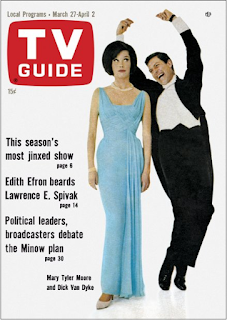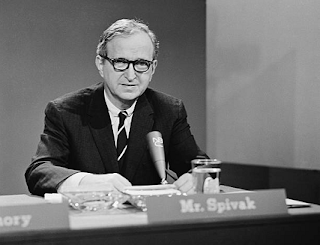This week in TV Guide: March 27, 1965
Yes, it's another fondly-remembered issue from the past. But take heart; next weekend offers a new issue! Well, sort of.
 I'm often fond, when writing here, of quoting the old French saying, "plus ça change, plus c'est la même"—the more things change, the more they stay the same. And as I've read through these TV Guides, I find that more and more to be the case. For example, take the following quote: "When I was a boy, a liberal was one who looked upon the state as . . . a necessary evil, to be watched night and day. Today, a ‘liberal’ is likely to be one who looks upon the state as a panacea.”
I'm often fond, when writing here, of quoting the old French saying, "plus ça change, plus c'est la même"—the more things change, the more they stay the same. And as I've read through these TV Guides, I find that more and more to be the case. For example, take the following quote: "When I was a boy, a liberal was one who looked upon the state as . . . a necessary evil, to be watched night and day. Today, a ‘liberal’ is likely to be one who looks upon the state as a panacea.”
Since we’re reviewing a TV Guide from 1965, you probably think that’s when this quote was authored, and that the point is to show how little things have changed in nearly fifty years. Any guest on Fox News might say the very words today without changing even a comma, and nobody would blink an eye; but in fact that quote comes from 1947, predating this TV Guide by almost twenty years.
The man who said that was at one time one of the more recognizable faces on television, but today it’s unlikely you’ve heard of him unless you’re my age, or even older, and that's a shame because he was one of the major figures in early television, someone whose influence continues today. His name was Lawrence E. Spivak , and for thirty years he was the moderator and power behind Meet the Press. Spivak, along with Martha Roundtree, created Meet the Press for radio in 1945, and added a television component in 1947. At the time he wrote the above, he was publisher of The American Mercury, a conservative magazine founded by H.L. Mencken. Spivak fought vigorously against Communism and what he saw as its infiltration of labor unions. He wrote against government control of the media, and advocated kicking the Soviet Union out of the United Nations.
 Nowadays, Spivak has buried any personal ideology in the name of fairness. "I couldn't maintain my position as an impartial interviewer in the eyes of viewers if they knew my political philosophy or position on any particular issue," he tells writer Edith Efron. Instead, he positions himself as "anti-everybody," with no one escaping his public grilling. And yet, when pressed, he will give us an insight into his personal opinions. "I still think that the conflict between the individual and the state is the big problem of our time," he says. "The question I ask is: How much freedom are we willing to sacrifice for how much economic security? I fear that if we keep allowing the Government to handle more and more of our problems, we'll get into trouble." Conservatives would probably accept this verbatim, and if you substitute "national" for "economic" when discussing the sacrifice of freedom, you'd probably describe every liberal's concern about the Patriot Act. "The old-fashioned liberal originally was a fighter against concentrated power in the Government," he concludes, echoing his comments from 1947. "But the contemporary liberals are seeking more concentrated power."
Nowadays, Spivak has buried any personal ideology in the name of fairness. "I couldn't maintain my position as an impartial interviewer in the eyes of viewers if they knew my political philosophy or position on any particular issue," he tells writer Edith Efron. Instead, he positions himself as "anti-everybody," with no one escaping his public grilling. And yet, when pressed, he will give us an insight into his personal opinions. "I still think that the conflict between the individual and the state is the big problem of our time," he says. "The question I ask is: How much freedom are we willing to sacrifice for how much economic security? I fear that if we keep allowing the Government to handle more and more of our problems, we'll get into trouble." Conservatives would probably accept this verbatim, and if you substitute "national" for "economic" when discussing the sacrifice of freedom, you'd probably describe every liberal's concern about the Patriot Act. "The old-fashioned liberal originally was a fighter against concentrated power in the Government," he concludes, echoing his comments from 1947. "But the contemporary liberals are seeking more concentrated power."
Efron says of Lawrence E. Spivak that his "heart is where Barry Goldwarter's is, his head is where [Socialist] Norman Thomas's is," meaning that Spivak is conservative in idology, but has the temperament of an anarchist who doesn't want to be told what to do. And that seems to me like a pretty good combination.
 I'm often fond, when writing here, of quoting the old French saying, "plus ça change, plus c'est la même"—the more things change, the more they stay the same. And as I've read through these TV Guides, I find that more and more to be the case. For example, take the following quote: "When I was a boy, a liberal was one who looked upon the state as . . . a necessary evil, to be watched night and day. Today, a ‘liberal’ is likely to be one who looks upon the state as a panacea.”
I'm often fond, when writing here, of quoting the old French saying, "plus ça change, plus c'est la même"—the more things change, the more they stay the same. And as I've read through these TV Guides, I find that more and more to be the case. For example, take the following quote: "When I was a boy, a liberal was one who looked upon the state as . . . a necessary evil, to be watched night and day. Today, a ‘liberal’ is likely to be one who looks upon the state as a panacea.”Since we’re reviewing a TV Guide from 1965, you probably think that’s when this quote was authored, and that the point is to show how little things have changed in nearly fifty years. Any guest on Fox News might say the very words today without changing even a comma, and nobody would blink an eye; but in fact that quote comes from 1947, predating this TV Guide by almost twenty years.
The man who said that was at one time one of the more recognizable faces on television, but today it’s unlikely you’ve heard of him unless you’re my age, or even older, and that's a shame because he was one of the major figures in early television, someone whose influence continues today. His name was Lawrence E. Spivak , and for thirty years he was the moderator and power behind Meet the Press. Spivak, along with Martha Roundtree, created Meet the Press for radio in 1945, and added a television component in 1947. At the time he wrote the above, he was publisher of The American Mercury, a conservative magazine founded by H.L. Mencken. Spivak fought vigorously against Communism and what he saw as its infiltration of labor unions. He wrote against government control of the media, and advocated kicking the Soviet Union out of the United Nations.
 Nowadays, Spivak has buried any personal ideology in the name of fairness. "I couldn't maintain my position as an impartial interviewer in the eyes of viewers if they knew my political philosophy or position on any particular issue," he tells writer Edith Efron. Instead, he positions himself as "anti-everybody," with no one escaping his public grilling. And yet, when pressed, he will give us an insight into his personal opinions. "I still think that the conflict between the individual and the state is the big problem of our time," he says. "The question I ask is: How much freedom are we willing to sacrifice for how much economic security? I fear that if we keep allowing the Government to handle more and more of our problems, we'll get into trouble." Conservatives would probably accept this verbatim, and if you substitute "national" for "economic" when discussing the sacrifice of freedom, you'd probably describe every liberal's concern about the Patriot Act. "The old-fashioned liberal originally was a fighter against concentrated power in the Government," he concludes, echoing his comments from 1947. "But the contemporary liberals are seeking more concentrated power."
Nowadays, Spivak has buried any personal ideology in the name of fairness. "I couldn't maintain my position as an impartial interviewer in the eyes of viewers if they knew my political philosophy or position on any particular issue," he tells writer Edith Efron. Instead, he positions himself as "anti-everybody," with no one escaping his public grilling. And yet, when pressed, he will give us an insight into his personal opinions. "I still think that the conflict between the individual and the state is the big problem of our time," he says. "The question I ask is: How much freedom are we willing to sacrifice for how much economic security? I fear that if we keep allowing the Government to handle more and more of our problems, we'll get into trouble." Conservatives would probably accept this verbatim, and if you substitute "national" for "economic" when discussing the sacrifice of freedom, you'd probably describe every liberal's concern about the Patriot Act. "The old-fashioned liberal originally was a fighter against concentrated power in the Government," he concludes, echoing his comments from 1947. "But the contemporary liberals are seeking more concentrated power." Efron says of Lawrence E. Spivak that his "heart is where Barry Goldwarter's is, his head is where [Socialist] Norman Thomas's is," meaning that Spivak is conservative in idology, but has the temperament of an anarchist who doesn't want to be told what to do. And that seems to me like a pretty good combination.
Published on March 23, 2019 05:00
No comments have been added yet.
It's About TV!
Insightful commentary on how classic TV shows mirrored and influenced American society, tracing the impact of iconic series on national identity, cultural change, and the challenges we face today.
- Mitchell Hadley's profile
- 5 followers



